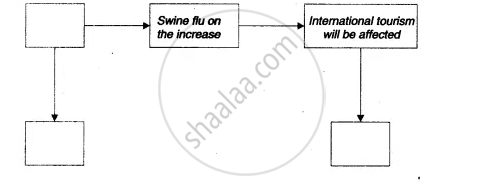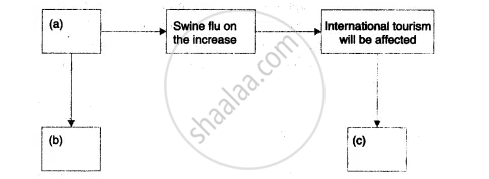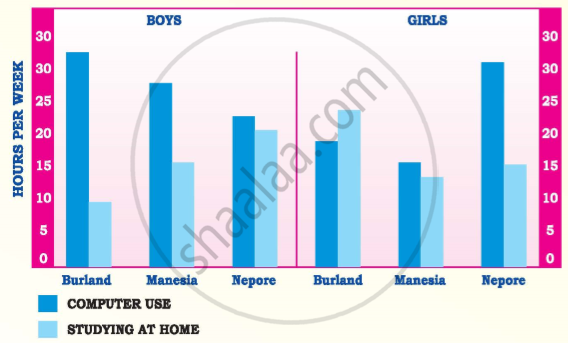Advertisements
Advertisements
Question
Prevention is better than cure.
Swine flu has been declared (as) a pandemic.
In groups of four discuss the following.
(a) What has been done by the authorities to cope with the problem?
(b) What are the consequences of such a major world-wide infection?
Write out the answer to the questions as a flowchart using the passive form of the verb.
Solution
Meant for group discussion at class level.
Answers to questions (a) and (b) as are follows :
(а)
- Sufficient information about preventive measures has been disseminated through print and electronic media all over the country.
- Special laboratories for testing have been set up at almost all govt, hospitals.
- Hospitals have been supplied with the prescribed medicine ‘Tamiflu’ in sufficient quantities all over the countries.
- Health Ministry officials both at centre and state levels have been posted to spread awareness about the swine flu and how to cope up with its incidence.
(b) If such a major world-wide infection occurs, the results will be disastrous. These could be like :
- death of millions of people
- turmoil all over the world among humans
- international traffic ground to a halt
- economies of many countries will stand affected
- many sectors will be affected so much that more panic will prevail.

(a) Swine flu caused by a virus/Swine flue declared as pandemic
(b) International community gets on High Alert
(c) Panic conditions will prevail leading to international crisis. A worldwide effort is on to find the cure of the disease.
APPEARS IN
RELATED QUESTIONS
Listen to an excerpt from a news telecast on a national channel carefully and complete the table given below.
| S. No. | Name of the Brave-heart | Place they belong to | Reason for Award |
| 1 | Saumik Mishra | Uttar Pradesh | foiled theft |
| 2 | Prachi Santosh Sen | saved a child | |
| 3 | Kavita Kanwar | Chhattisgarh | |
| 4 | Jodhpur | dodged marriage to 40 year old | |
| 5 | Rahul-balloon seller | Delhi/ National Capital |
|
| 6 | M. Marudu Pandi | Tamil Nadu | averted rail disaster |
| 7 | Bangalore | saved a baby caught in bull fight | |
| 8 | Silver Kharbani | Meghalaya | |
| 9 | Yumkhaibam Addison Singh | saved an eight year old from drowning | |
| 10 | Uttar Pradesh | saved people from drowning | |
| 11 | Haryana/Jind | helped nab armed miscreants | |
| 12 | Kritika Jhanwar | fought off robbers |
Answer the following question briefly.
Describe John A. Pescud with reference to the following points:
- Physical appearance
- His philosophy on behaviour
- His profession
- His first impression of his wife
- His success
The following is a flow chart showing the course of the brook. Can you fill in the
blank spaces with help from the phrases given below?
a) passes under fifty bridges; b) comes from the place where coots and herons live;
c) passes lawns filled with flowers; d) crosses both fertile and fallow land; e) goes
through wilderness full of thorny bushes
Roads are fascinating as metaphors for life, change, journeys, partings,
adventure, etc. or simply as roads. This is probably why they, and all their
attendant images, have permeated art, literature and songs. In the poem, Frost
uses the fork in the road as a metaphor for the choices we make in life. Thus the
roads are, in fact, two alternative ways of life. What other nouns, according to
you could be used to represent life?
River
________________
________________
________________
________________
________________
Rain in the hills and rain in the desert present entirely different scenario. In the
hills it revitalises the greenery and freshens the vegetation; it waters the parched
land and relieves the thirsty and panting souls in the desert.
(i) This has been a year of scanty rains. Imagine how the rain would be welcomed
when it pours in the hills and in the desert after a long dry spell. Choose one such
place and describe
(a) What are you likely to see?
(b) What would happen to the rain water?
(c) What would be the scene before and after the rain?
(ii) How would you express rain as
On the basis of your reading of the poem, complete the following table.
| Stages in the life of the poet | Activities | Consequences |
| Youth | eating toffees ____________ |
____________ |
| Adulthood | ____________ | gazing at the dentist in despair. |
The convict is the product of the society he had lived in, both, in terms of the
suffering that led him to steal a loaf of bread, as well as the painful sentence he
received as a punishment for his "crime". He was imprisoned for stealing money
to buy food for his sick wife. This filled him with despair, hopelessness,
bitterness and anger at the injustice of it all.
Conduct a debate in the class (in groups) on the following topic. Instructions for
conducting a debate and use of appropriate language are given in the unit “Children” of
the Main Course Book.
'Criminals are wicked and deserve punishment'
First, you will hear a local radio programme, read out by teacher / student which is given below which will give you ideas for your own programme. First, listen without writing anything.
Presenter 1: A very good day to all our listeners. This is your local radio station, Class IX Local Radio - bringing you up-to-the - minute news, current affairs, music, interviews, round-ups - and much much more.
Presenter2: Yes, and in today's programme we have a special report from Ketaki Lahiri on "Safety at School".
Presenter 1: Nikhil Gomes brings you his regular weekly review of "Beyond the Timetable",
Presenter 2: And Leena invites you to "Meet the Teacher".
Presenter 1: And lots more - jokes, news -you name it and we have it. We start with the round-up of School News by our roving correspondent - Anant Singh. Anant, over to you.
Anant: Good morning, everybody! The highlight of this weeks' School News is that our school football team lost every single match it played in the YMCA football tournament at league level. The physical education teacher is so livid that he has threatened to make the school team practice on a doubletime schedule from tomorrow. So, friends, it's "wake-up" at 4 a.m for all footballers henceforth.
In another school news, the tiny tots were taken on a visit to the zoo. Some, it is said, did not wish to return. One accompanying teacher, we are told, had a tough time convincing them that life outside is better!
Class XII put on a one-act play "Examination Fever" which was written, directed and produced by them. The proceeds from this show are being sent to "Prathyasha" - an organisation that helps handicapped children.
Look out next week for new faces around the school. A group of 20 students from Japan are arriving on a cultural exchange programme, We might even get one of them on our next edition ofThe Class IX Radio Show!
Presenter 1: So ... Lots happening at school, it seems,-and lots more on your Local Radio. It's time for jokes now. Over to you, Hafeez and Aarohi.
Aarohi: Waiter , Waiter , what's wrong with these eggs ?
Hafeez: I don't know. I only laid the table;
Aarohi: Waiter, waiter, what's this fly doing in my soup?
Hafeez: Breaststroke, I think, Sir,
Teacher: I wish-you would pay a little more attention.
Pupil: I'm paying as little as I can.
Teacher: You should have been here at 9 o'clock.
Pupil: Why, what happened?
Presenter 2: Thank you, Hafeez and Aarohi. And don't forget, listeners, to send in your jokes. Every original joke will win you a reward of RslO/- for each one played on your favourite radio programme - Class IX Local Radio - the station just for you.
Presenter 1 : And now to your regular spot "Meet the Teacher", in which Leena interviews one of your favourite teachers to discover the real person "behind the chalk dust".
So it's all yours, Leena.
Leena: Thank you ! I'm delighted today to be able to interview the Head of the Science Department, Mr Chirag Sharma. Mr Sharma, what all our listeners are dying to know is - are you as strict at home as you are at school?
Mr Sharma: (Laughs heartily). I don't have a bunch of forty naughty children at home.
Leena: Did you ever get into trouble when you were at school?
Mr Sharma : Have you ever thought about how I am able to catch you in your tricks? I was usually up to the same tricks at school! No, I'm afraid my teachers were not very happy with me.
Leena: How good were you in your studies, Sir?
Mr Sharma: Ah, that was my strong point. My work was always up-to-date and fairly good. I was naughty, but I was also keen to learn more.
Leena: How do you spend your evenings and holidays, Sir?
Mr Sharma: I like to spend time at home with my teenage children. We have common tastes in music.
Leena: Any message for our listeners Sir?
Mr Sharma: Yes. Fun and-play have their place in our lives. We must enjoy our play. At the same time, we must work with enthusiasm and sincerity.
Leena: Thank you, sir !
Presenter 2 : Thank you Leena for that fascinating interview. I'm sure we all know, now what makes Mr Sharma 1tick1• And now it's time for a break. It's "advert time".
"Buy two but pay for one!"
Ruchita of VIIC has a fabulous offer. Two pencil boxes for the price of one. Pay Rs 5 / for the bargain.
Lost - A Keltron calculator. Krishna of Class XIIA has offered a treat in the school canteen to the finder.
Presenter 1: And now, a very serious subject. Ketaki has been researching the topic 'Safety at School'. She has come up with some very disturbing findings. This is the report. Ketaki?
Ketaki: As I went around the senior school I was alarmed to find a number of broken electric sockets with exposed wires. Beware of this hidden danger, senior students. That brings me to another danger - this time in the primary block. The lid of the ground level water tank is broken. Till it is repaired, students are warned not to go anywhere near it.
Presenter 2 : Well, time1s up boys and girls of Class IX Local Radio - bringing you news and entertainment of interest to you, in your school and locality. Until next week ...
Study the following graph and the accompanying report.

Our study of the time spent by students at the computer and studying at home in three countries has revealed some interesting facts.
First, the majority of boys and girls in the age groups of 14-16 in these countries spend more time at the computer than studying at home. Children in these countries spend an average of20-30 hours per week in comparison to 10-15 hours of studying at home. The only exception is Burland where girls spend more time studying at home than at the computer.
Secondly it is evident that in all three countries, time spent at the computer is having a serious impact on the number of hours spent studying at home. In fact, the greater the number of hours spent at the computer, the fewer number of hours are being spent studying. For example, boys in Burland spend an average of 32 hours at the computer while they spend about 8 hours studying at home.
Each student will now complete his/her half of the following table (Hockey or Football), by adding information from the text each has read.
| Hockey | Football | |
| Ball : | ||
| Playing Area: | ||
| Duration : | ||
| Judging : | ||
| Penalties : | ||
| Penalty Area : | ||
| Cards : |
